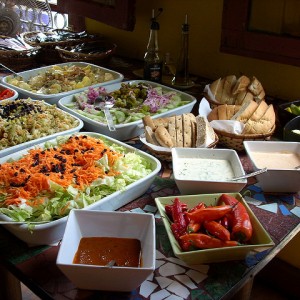
Photo: Manuel Alarcón via Flickr Creative Commons
This being early April, I found myself working on my taxes during some beautiful sunny weather last weekend — and wishing I’d done them the week before, when it was raining!
It’s too bad paying taxes feels like such a solitary activity, because it’s really a community endeavor. I think of it like a potluck buffet: everyone brings a little something to the table, and as a result we all have more to choose from. Is this meal perfect for me personally? Not always. But it works for my fellow citizens pretty well. After all, even if I don’t necessarily like or need every item being served (tater tot casserole, anyone?), there’s something for everyone — and far more than I’d ever be able to prepare or provide on my own.
The three big tables in this buffet are local (cities, counties and other districts), state and federal. Each has a role to play in serving the whole population, though they do it in different ways.
Like many cities, the City of Everett’s budget funds day-to-day expenditures for a variety of services, including: police and fire protection, water and sewer services, transit, street maintenance, parks, the library and support services. That’s all on the table thanks to local business taxes, sales taxes, property taxes and other fees people pay throughout the year.
The biggest three dishes on our state’s table are human services, public schools and higher education.
Human services — like medical and public assistance, long-term care, health care and prisons — serve 1 of every 3 people, including more than 1 million children, in our state.
Public schools — that’s state funding for K-12 school districts — provide public education for more than 1 million children.
Higher education — serving more than 233,000 full-time-equivalent students, (adding up to more than 300,000 actual students) , and providing state financial aid to approximately 89,000 students — supports public four-year universities and community and technical colleges.
Other smaller, but still important, dishes on the state’s table include: transportation (highways and ferries, the Washington State Patrol and the Department of Licensing); environmental protection, management and recreation; and debt service on construction bonds.
To put that on the table, when we purchase most tangible things — like clothes, gasoline or coffee — we pay sales tax. When businesses receive your money, they pay Business and Occupation (B&O) tax on the revenue. The state also receives federal grants, and licenses and permits generate another chunk of revenue.
The main course on the federal table includes: health, unemployment compensation, the military, veterans benefits, food and agriculture and education. Side dishes cover housing and community, energy and environment, international affairs, transportation and science.
As workers we get federal income tax deducted from our paychecks, based on our own forecast for family income, dependents, education costs, etc. April’s mid-month tax ritual is how we each make sure we’ve paid or will pay our share for that.
With each paycheck we also pay 7.65 percent of every dollar (up to $118,500) toward Social Security and Medicare. The beauty of that system is that it’s a promise fulfilled to the past and made to the future. Today’s contributions pay for people already retired; tomorrow’s payments will insure retirement checks when older workers leave the workforce to enjoy their golden years.
That explains why — even among hard-right types — there’s such affection for Social Security and Medicare. It’s easy to see the contributions and the benefits. Not every public service or structure is viewed the same way — but they should be.
Take a step back for a moment. Do you personally use every government service available every single year? No. Do you agree with the public budget priorities for each? No, and neither do I. But I think that’s missing the point. In a complex and interconnected society like ours, different people are going to eat from different dishes at different times. To keep our dinner tables full, we each have to do our part when it comes to paying our share.
Happy Tax Day!
To learn more about local priorities, budgets and taxes, go to the City of Everett’s budget at: https://everettwa.gov/330/Budget. The Washington Legislature publishes a “Citizen’s Guide to the Washington State Budget” each year. The 2016 edition is here: tinyurl.com/WashStateBudget. For insight into the federal budget, the National Priorities Project is a great resource:https://www.nationalpriorities.org/interactive-data/taxday/.
Original: Everett Herald »
More To Read
March 24, 2025
Remembering former Washington State House Speaker Frank Chopp
Rep. Chopp was Washington state’s longest-serving Speaker of the House
February 11, 2025
The rising cost of health care is unsustainable and out of control
We have solutions that put people over profits
January 29, 2025
Who is left out of the Paid Family and Medical Leave Act?
Strengthening job protections gives all workers time they need to care for themselves and their families
